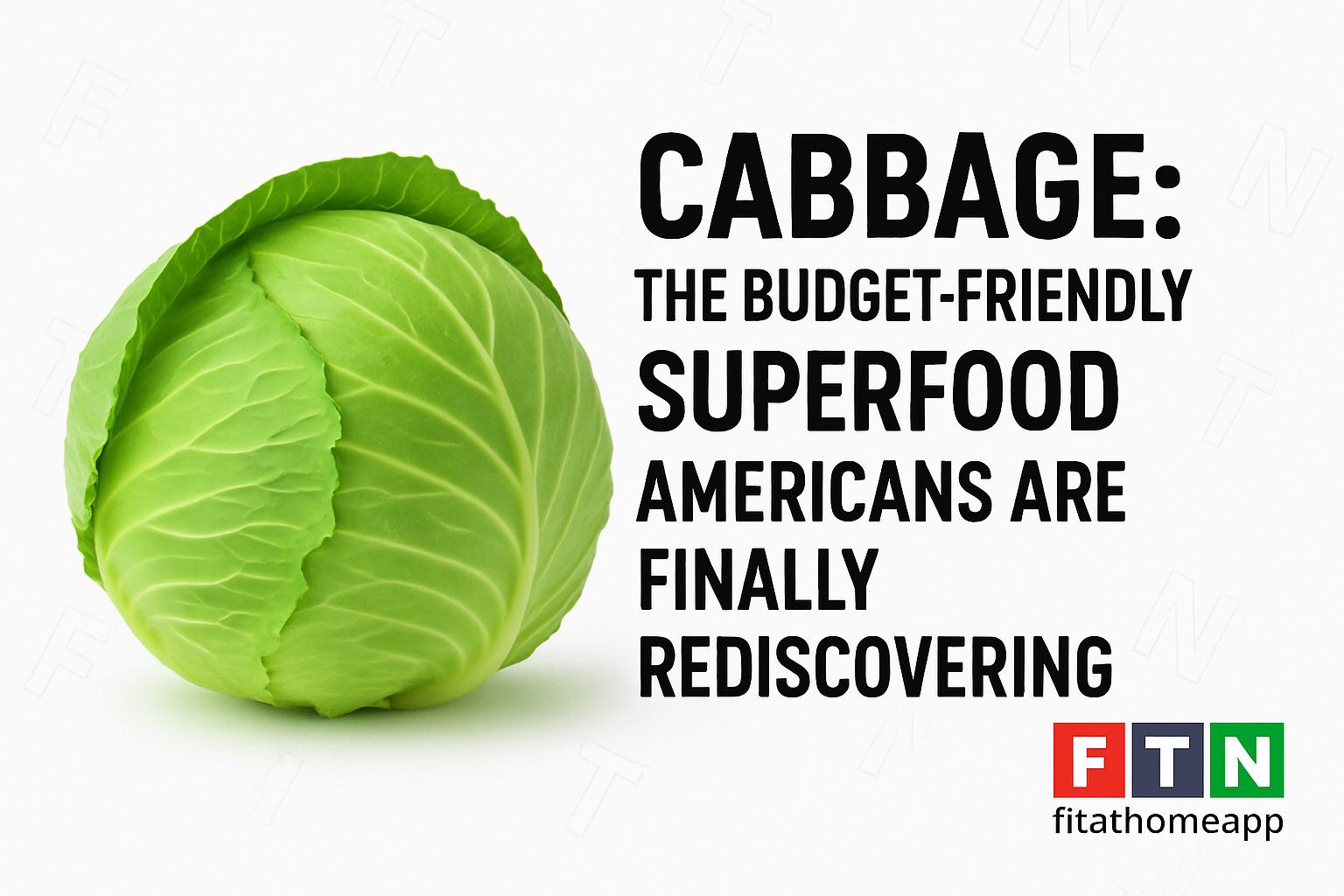Introduction
In today’s world of trendy superfoods and exotic health supplements, one humble vegetable is making a quiet comeback — cabbage. Often overlooked, this affordable, nutrient-packed leafy green is gaining renewed attention among health-conscious individuals, athletes, and budget-savvy families alike. With its impressive health benefits, long shelf life, and culinary versatility, cabbage is proving to be more than just a side dish — it’s a superfood in its own right.
Why Cabbage Deserves a Spot on Your Plate
Cabbage belongs to the cruciferous family of vegetables, alongside broccoli and Brussels sprouts. It’s low in calories but incredibly rich in nutrients. Just one serving provides a strong dose of vitamins C and K, both of which play vital roles in immune support, bone health, and healing. It’s also high in fiber, helping to promote healthy digestion, reduce cholesterol, and support weight management.
Another benefit? Antioxidants. Cabbage contains plant compounds like sulforaphane and anthocyanins that may reduce inflammation and protect against certain diseases. These qualities make cabbage not just a healthy food—but one that can help improve long-term wellness.
A Superfood on a Budget
In a time when grocery prices are rising, cabbage stands out as one of the most affordable nutrient-dense vegetables on the market. It’s widely available, usually costs less than a dollar per pound, and can stay fresh in the fridge for weeks when stored properly. This makes it a smart choice for families looking to stretch their food budget without sacrificing nutrition.
How to Add Cabbage to Everyday Meals
Cabbage is one of the most versatile ingredients in the kitchen. Whether raw, roasted, sautéed, or fermented, it fits easily into all kinds of dishes:
Raw: Use shredded cabbage in salads or slaws for a crunchy, fresh texture.
Cooked: Sauté it with garlic and olive oil for a simple side dish.
Soups & stews: Add chopped cabbage to broths for extra heartiness and nutrition.
Fermented: Try making or buying sauerkraut or kimchi for probiotic benefits.
The beauty of cabbage lies in how it absorbs flavor, making it suitable for everything from tangy dressings to savory spices.
Red, Green, and Savoy: Which Should You Choose
There are several varieties of cabbage, each with its own flavor and best uses:
Green cabbage: Mild flavor, ideal for slaws and stir-fries.
Red cabbage: Vibrant color and slightly peppery taste; great for salads and pickling.
Savoy cabbage: Tender, crinkled leaves perfect for wraps and stuffing.
Each type is rich in nutrients, so the best one depends on your recipe and personal taste.
Health Benefits You Might Not Expect
Regular cabbage consumption may support more than just digestion. Studies suggest it may help:
Boost immune function through high vitamin C content.
Support bone strength with vitamin K.
Improve gut health thanks to its fiber and potential probiotic benefits.
Reduce risk of chronic disease through its antioxidant properties.
For those managing their weight, cabbage offers a high-volume, low-calorie food that can keep you full longer.
Debunking Common Myths About Cabbage
Some avoid cabbage due to its strong smell or fear that it’s bland. But how you prepare cabbage makes all the difference. Roasting brings out a natural sweetness, while combining it with bold seasonings transforms it into a flavorful centerpiece. Cooking methods like steaming or pan-frying also reduce the sulfur-based odors that can occur with over-boiling.
Final Thoughts: A Superfood for Every Household
Cabbage may not be the flashiest vegetable, but its benefits are hard to ignore. It’s nutrient-rich, affordable, easy to cook, and fits into a wide variety of eating styles — from vegan and vegetarian to low-carb and high-fiber diets.
Whether you’re an athlete looking to recover smarter, a parent feeding a family, or someone just trying to eat a little healthier, cabbage is worth a second look
My Personal Take on the Video
This video, “The Amazing Health Benefits of Cabbage | Dr. Berg”, delivers a succinct and engaging overview of cabbage’s wellness perks—highlighting its anti-cancer, gut-supporting, and antioxidant properties
Nutrient-Rich & Antioxidant Power
Cabbage is a low-calorie cruciferous vegetable loaded with fiber and vitamins C and K. It offers anti-inflammatory and antioxidant benefits, making it valuable for long-term wellness.
Food & Hydration Support
It’s 90–99% water, contributing to hydration from foods. Including cabbage helps maintain fluid balance and supports physical performance.
Gut & Immune Health
Cabbage supports digestive health via fiber and may boost immunity and inflammation control through glucosinolates and sulforaphane.
Budget-Friendly & Practical
Affordable, widely available, and long-lasting—cabbage stands out as a nutrient-dense yet economical food, ideal for athletes and families alike.
The Powerful Connection Between Cabbage and Broccoli
Cabbage and broccoli are two of the most popular and nutrient-dense vegetables from the cruciferous family, scientifically known as Brassicaceae. Both vegetables share a remarkable nutritional profile that makes them essential for a healthy diet. They are rich sources of vitamins C and K, dietary fiber, and potent antioxidants, which contribute to reducing inflammation and supporting immune function.
Nutritional Benefits of Cabbage and Broccoli
Both cabbage and broccoli are loaded with glucosinolates, sulfur-containing compounds that are responsible for their distinctive flavors and powerful health benefits. These compounds have been extensively studied for their potential to protect against certain types of cancer and promote detoxification processes in the body. Additionally, the high fiber content in these vegetables aids digestion and helps maintain a healthy gut microbiome.
Versatility in Cooking and Diet
One of the advantages of cabbage and broccoli is their versatility in the kitchen. They can be eaten raw in salads, steamed, roasted, or incorporated into soups and stir-fries. This flexibility makes it easier to include these super vegetables regularly in your meals, ensuring you benefit from their recovery-supporting and disease-preventing properties.
Why Choose Both for Optimal Health?
Including both cabbage and broccoli in your diet offers a synergistic effect, maximizing antioxidant intake and anti-inflammatory benefits. Whether you’re an athlete focusing on recovery or someone aiming to improve overall wellness, these vegetables can play a key role in your nutritional strategy.


[…] Nutritional Connection Between Mulukhiyah and Lettuce: A Powerhouse of Leafy […]